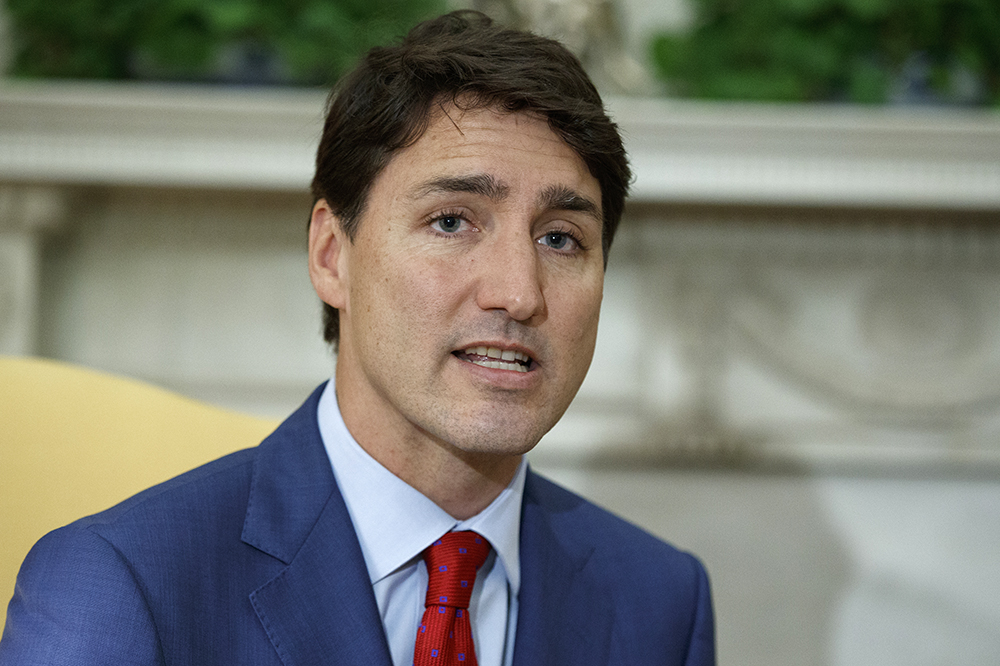(RNS) This week, Time magazine published a 2001 photo of Justin Trudeau, now Canada’s prime minister, attending a party with a “Thousand and One Nights” theme as Aladdin, wearing brownface and a turban.
The debate over the photo, aided by the internet, has been intense and international. Most who are critical of his racist “costume” have either claimed that it is in poor taste and unintentional or else harmful and dehumanizing.
I think it’s both.
In the past two weeks, in the class I teach at Union Seminary in New York, we have been reading Edward Said’s germinal work, “Orientalism,” making the timing of this brownface conversation providential for our discussions.
At the risk of oversimplifying, Said shows how European colonialism was founded on the principle that the Eastern peoples and cultures are inferior to, and in need of saving by, those of the West. The drive to colonize and subjugate people around the world relied on this supremacist logic and uneven exchange.
The stereotypes of Eastern people — irrational, uncivilized, backward — are part of Orientalism’s legacy. We continue to produce and reproduce these stereotypes over time and across cultures, from our romanticizing inaccurate portrayals of Hindus and Buddhists as incapable of extremist violence (see today’s Myanmar and India) to equally inaccurate and demonizing portrayals of Muslims as inherently prone to violence.
These are two sides of the same Orientalist coin. Both are dehumanizing because they strip people of their full human selves and flatten them into types.
Like white supremacy, Orientalism can be understood as a lens through which we see the world and also a power dynamic by which the world has been structured. I find this approach to understanding Orientalism helpful because it reminds us that Orientalist ideas are so pervasive that we internalize them without necessarily being conscious of it.
More on Broadview: MP Celina Caesar-Chavannes on racism in Canadian politics
Current debates on racism also help us think about harm in this case. The perpetuation of Orientalist stereotypes is problematic because they reproduce power dynamics that have their roots in supremacy, dehumanization and violence. Whether we justify our actions by claiming ignorance or good intentions, it’s undeniable that they impact others in harmful ways.
Just because something is relatively less harmless, in other words, doesn’t mean it’s not still harmful and dangerous. We can’t wait until someone is killed out of racist hate to take a stand. At that point, it’s already too late. We need to squash racism whenever we encounter it to ensure that we don’t allow it to fester.
It’s this way of looking at Orientalist racism that helps us understand how Trudeau’s decision to wear a turban and brownface for a party could be both in poor taste and unintentional and harmful and dehumanizing.
After the racist photo came to light this week, Trudeau offered an apology that reflects this outlook. I should have known better, but I didn’t. I am really sorry. I am disappointed and pissed off.
His apology claims ignorance, but it also indicates that this neither excuses his wrongful behavior nor undoes the damage and harm it has caused to those affected. It also indicates that he is aware that such behavior is unbecoming of any human being, let alone a world leader who champions diversity and inclusion.
At the least, this photo gives us an opportunity to understand that good intention and harm are not mutually exclusive. Any one of us can be guilty in perpetuating stereotypes of foreigners that are harmful and dangerous, whether we mean it or not. That’s an important lesson for us all to take away.
















Learning takes time. We learn different things at different times in our lives and mostly by our mistakes. Jesus always teaches us to look within ourselves at who we really are. He teaches us to look at the “us” that we never show anybody else and tells us not to judge others based on that reflection. It’s one of his favourite themes. Have we not all done things in our past that we are not proud of? Have we not all made mistakes? If we are going to be judged today on things we did in our past then what is the sense of continuing education? What is the sense of forgiveness? What is the sense of new understanding? Is there anyone who can be fit for public service? As a teenager I was against homosexuality until I educated myself and came to see one’s sexuality on a deeper level and as a minister I led my church to adopt a policy of inclusivity when it came to marriage. Justin apologized. I feel he probably knows better today. Where is the forgiveness in our society?
Do we follow the teaching of Jesus or do we only pick and choose when it suits our purpose? Let us all learn to look within ourselves, at who we really are, before we judge others.
Gosh, I wish you would use Scripture to validate some of your points.
I agree to a point that we are not to judge – especially nonbelievers. Having said that, as a body of believers we are called to judge each other. I Corinthians 5 and 6
However… Paul gives us guidelines on how to do this Romans 12:18 We are to TRY and live peacefully with all men. In Galatians 6:1 it needs to be in gentleness.
Jesus stated it best in Matthew 18:15-17 on how to reconcile, note that this not on forgiveness.
Forgiveness is to remedy your relationship with God, and moving on in your life.
Finally, in this particular case, I don’t think people are down on Justin Trudeau being a “brown face” or whether he is truly sorry for what he did, or the fact that he got caught. What bothers people is his hypocritical approach to others who are perceived as “racists” in their actions. The very thing you’re trying to say.